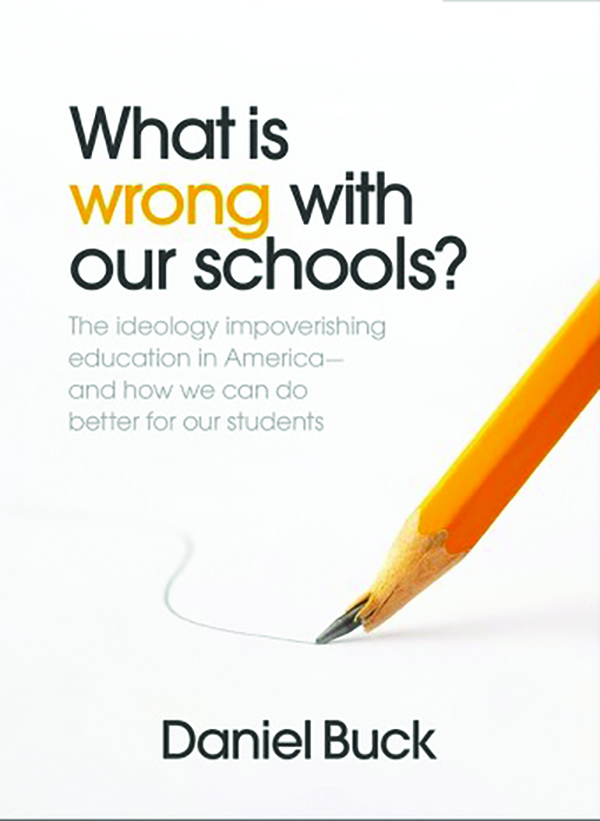
A truly thoughtful approach to fixing our schools
Avi Woolf
The progressive Left controls monopolistic public institutions, especially schools. Activists such as Corey DeAngelis and Christopher Rufo, with their fight for maximal school choice and against radical curricula like critical race theory, respectively, are but the most prominent figures in the struggle to use privatization and choice to break that control. But markets are ultimately only as good as what’s sold in them. If opponents of the existing system do not make a vocal, positive, and persuasive case for better alternatives, the existing faulty system will remain predominant.

Enter Daniel Buck. A relatively young but experienced English teacher, Buck has now made that case in What Is Wrong With Our Schools? in a way that should make everyone take notice and think, even those who generally reflexively reject conservative arguments about education.
Buck argues that a core part of the problem of schools in America today is the adoption of a whole slew of bad ideas he traces to their historical origins, from the narcissistic romanticism of Rousseau to the radical deconstruction of Freire to the utilitarian progressivism of Dewey. Once arcane, these misbegotten theories have become faddish to the point that they are accepted wisdom that can be dangerous to challenge without harming one’s own career or financial prospects in certain fields. Together they work to destroy a traditional ecosystem of learning that generally functioned well and that was in need of improvement and refinement — not demolition.
Buck further argues that the excessive focus of teachers unions and mainstream education policymakers on easily measurable things such as class size misses the point. All the struggles over the broad framework dodge the question of core content, the meat and potatoes of what school actually offers. It’s akin to providing junk food in really well-designed packaging.
Folksy and relatable examples like this are strewn throughout the book, making it a lot more enjoyable to read compared to the usual dry-as-dust policy papers or angry curmudgeonly rants one usually finds in right-wing writing on education. Buck’s youth also works in his favor, as he shows convincingly that it’s possible to be a non-left-wing teacher and to be just as idealistic and compassionate as a younger millennial while critiquing prevailing teaching. We need more like him, even or perhaps especially in subjects like literature.
If I were to characterize Buck’s approach to education, I would call it “neotraditionalist.” Using cognitive science, social science, classical sources, and his own experience, he makes a convincing case that many of the things so many people hate about the old system are actually vital for things like creativity, independent thinking, and professional skills. It turns out the old ways have a lot to them, and modern methods can prove it.
This is especially true of all that knowledge that needs to be memorized and practiced and tested over and over. Buck reminds us from examples ranging from jazz musicians to modern artists that none of these people would have become as amazing as they were without first acquiring a foundation in existing art and music so thorough that it became second nature to them, using the methods of memorization and testing we now so deplore. Indeed, as Buck shows, those cool-sounding “project-based learning” and other student-centered programs tend to benefit those who have already passed through the stage of being “drilled” in core knowledge and skill.
“Knowledge is not formed in the mind of a student ex nihilo,” and even searching the internet or social media can only really benefit someone with enough reference points to ask the right questions and look at different angles. There is simply no quick fix or hack to bypass this necessary hard work, which Buck shows is rarely the torture some think it, in order to then flourish as creative and knowledgeable adults. You can’t become an expert in 10 easy steps any more than you can get rich quickly.
Buck is passionate about restoring the authority of the teacher and school to impose rules and serve as a source of authority and structure, though thankfully shorn of past methods like corporal punishment. Buck is correct that if the teacher abdicates their role as the authority, peers will take their place — often toxic peers. This undermines everyone’s learning, as the rules children impose are often more akin to the jungle or a prison. Like knowledge, baseline structure and rules are simply a sine qua non for any further learning, no matter how unpleasant it sometimes is.
The book is not free of its own problems, of course. Some of the sections, such as the one on the question of 21st-century workforce skills, feel more like afterthoughts or blog posts, much less ripe than the deep and thorough work on content knowledge and structure. It would have been better to either develop them or leave them out.
I also question just how much Freire or Rousseau are actually the cause of the current bad trends in American schools. If anything, they seem to me to be post-facto justification for some long-standing American schools of thought: the tradition of democratic suspicion of authority, an often exaggerated faith in the reason of every individual, and suspicion and even disdain for old ways and traditions. Mark Twain and other American critics of the schools in their day certainly did not need to know postmodern European critics of education to often sound like them.
That being said, this book is nevertheless a wonderful breath of fresh air and a welcome sign that critics of education on the Right are slowly leaving the number crunching and negativity behind in favor of actually selling an attractive, positive vision. And Buck’s vision is a tried and tested product in the market of education. Here’s hoping parents, children, teachers, educators, and citizens at large are interested in buying.
Avi Woolf is an editor and translator. He has been published in Arc Digital, National Review, the Bulwark, and Commentary.
